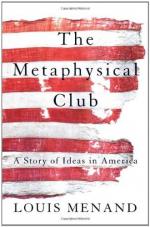
|
| Name: _________________________ | Period: ___________________ |
This test consists of 15 multiple choice questions and 5 short answer questions.
Multiple Choice Questions
1. Many Southerners and Northerners found a problem with _________ because it seemed to contradict Genesis.
(a) Polygenism.
(b) Polytheism.
(c) Types of Mankind.
(d) Monogenism.
2. ___________was a physician from Montgomery, Alabama that did not agree with slavery but was afraid of Black people.
(a) William James.
(b) George Glidden.
(c) Louis Agassiz.
(d) Josiah Nott.
3. ___________was a protege of George Cuvier and Alexander von Humboldt.
(a) Henry James Jr.
(b) Louis Agassiz.
(c) William James.
(d) Samuel George Morton.
4. The method of least squares was used by Charles in his research for the Coast Survey which led to being considered one of the best ____________
(a) Statisticians.
(b) Politicians.
(c) Meteorologists.
(d) Astronomers.
5. Henry James Sr. rebelled against his father and took up religion in the form of ___________.
(a) Swedenborgian.
(b) Scottish Baptist.
(c) Presbyterian.
(d) Lutheran.
6. Before the war, Holmes considered _________ to be the center of intellectual thinking, like his father before him.
(a) New York.
(b) Boston.
(c) Jamestown.
(d) Philadelphia.
7. The Civil War caused the beliefs of previous times to be __________.
(a) Embraced.
(b) Promoted.
(c) Discredited.
(d) Respected.
8. Which person was not a member of the 'Septum'?
(a) Henry Buckle.
(b) Chauncy Wright.
(c) Charles Eliot.
(d) Ephraim Gurney.
9. __________ talked the Belgian government into building an observatory and sending him to Paris to get training.
(a) Henry Thomas Buckle.
(b) Joseph Fourier.
(c) Adolph Quetlet.
(d) Charles Pierce.
10. In April of 1864, an article was published in the __________ that made him rethink his exhaustion with the war.
(a) Atlantic Review.
(b) New Yorker.
(c) North American Review.
(d) Harvard Magazine.
11. The philosophy that began to emerge with the formation of the Metaphysical Club is known as_________.
(a) Polygenism.
(b) Pragmatism.
(c) Evolutionism.
(d) Monogenism.
12. Benjamin and Charles caused fear in the United States because of their use of ___________ in the trial.
(a) Signatures.
(b) Witnesses.
(c) Statistics.
(d) Fear tactics.
13. Holmes' experiences during the war led him to believe that imposing one's beliefs would always lead to __________.
(a) Violence.
(b) Peace.
(c) Slavery.
(d) Change.
14. _________ states that the government is created by individuals for the purpose of protecting those individuals.
(a) Pragmatism.
(b) Transcendent Unity.
(c) Conservative Individualism.
(d) Liberal Individualism.
15. Unlike Darwin, Charles Pierce did not believe that randomness __________.
(a) Was a fact of nature.
(b) Is related to statistics.
(c) Serves a purpose.
(d) Is based on laws.
Short Answer Questions
1. Wright believed that ___________ is the difference between facts and values.
2. The war had been compared to _________ and the Union soldiers rallied themselves around it.
3. Holmes was not present for the Battle of Fredericksburg and viewed it as _________.
4. __________ created the method of least squares in order to find the true location of the object.
5. After the murder of ________ Emerson's distrust of the South grew as did his affiliation with the abolitionists.
|
This section contains 444 words (approx. 2 pages at 300 words per page) |

|




